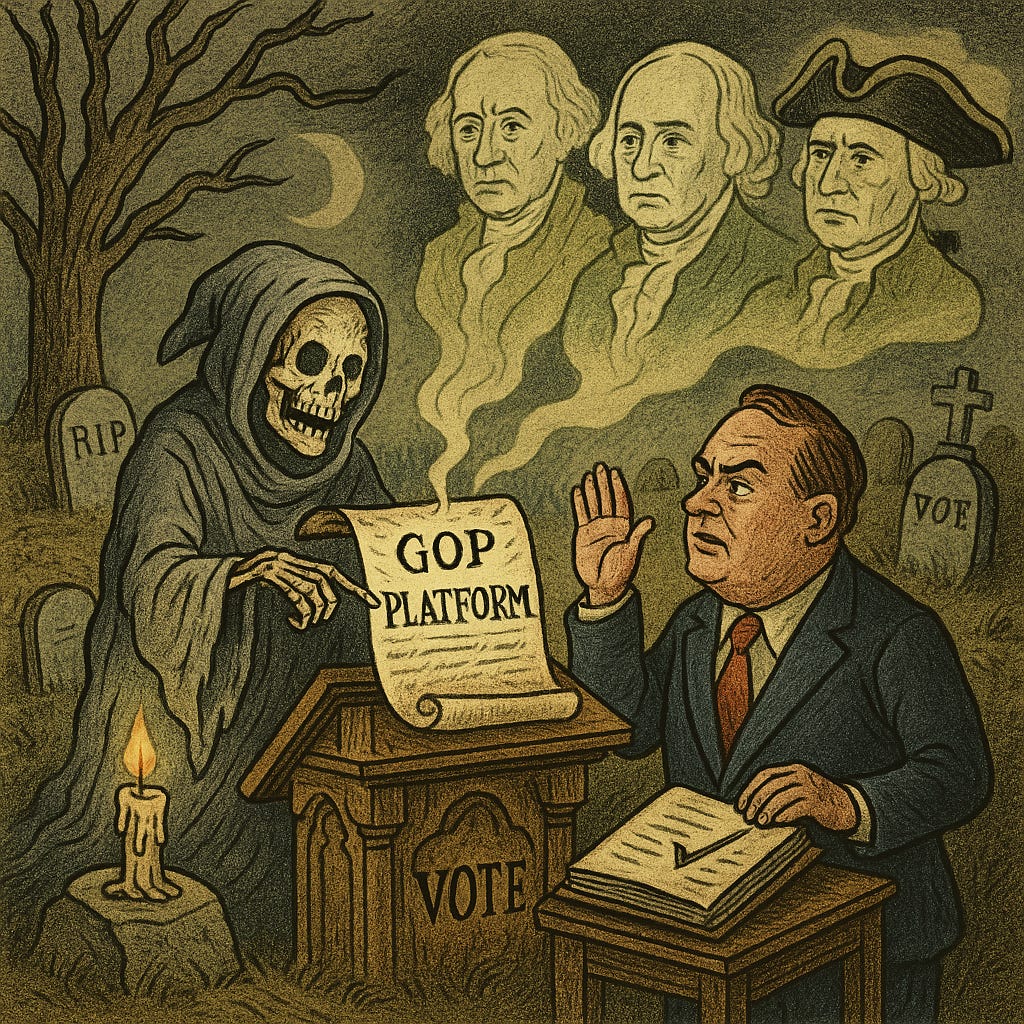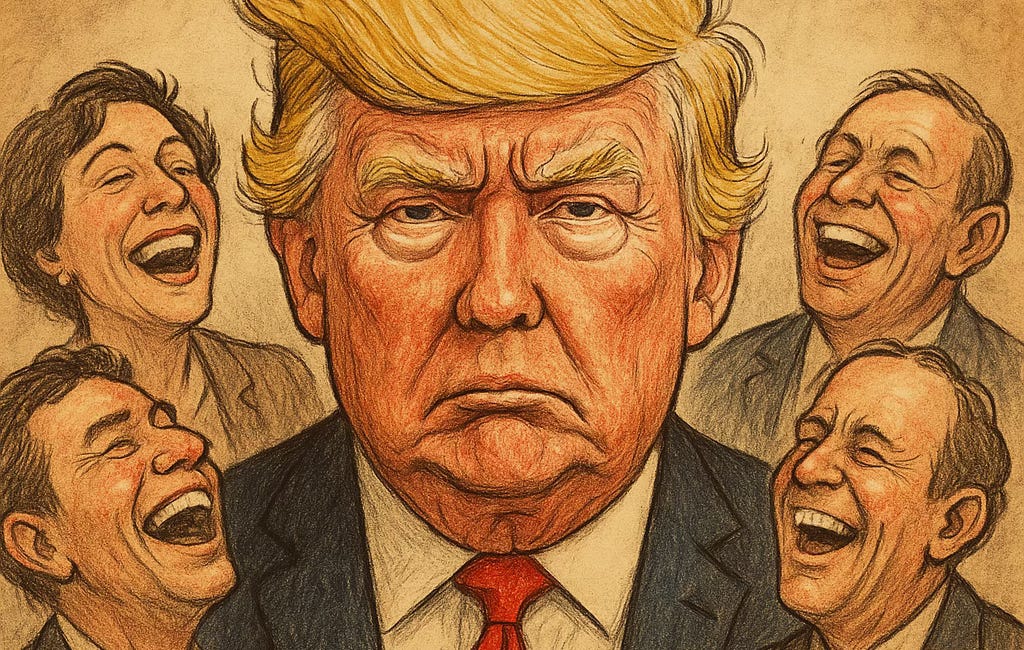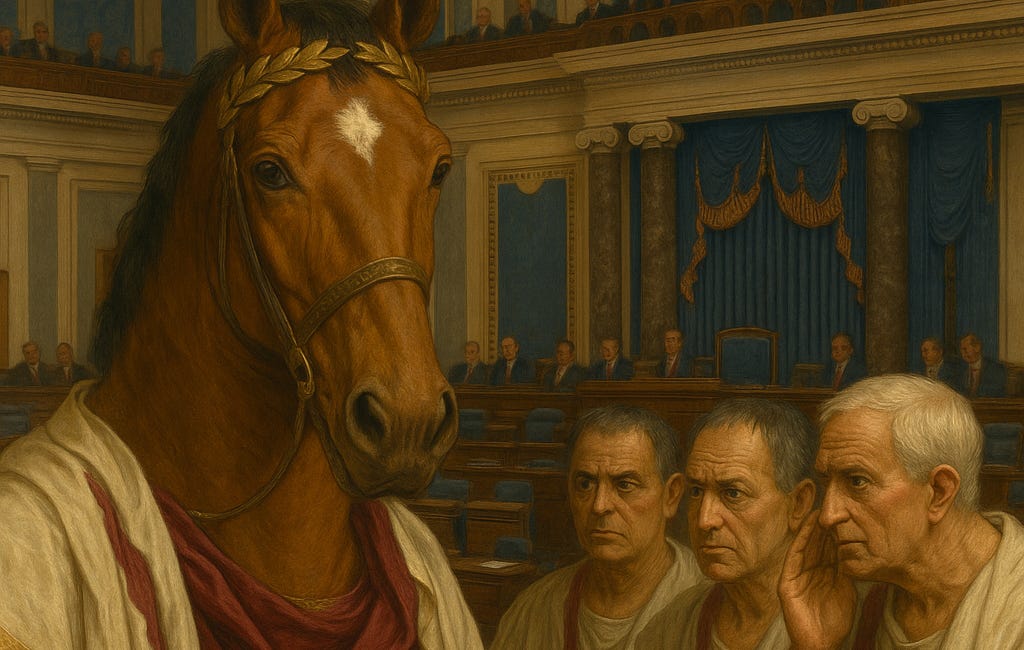The Dead Still Vote in America: Electoral Myths and Modern Necromancy
Electoral Myths, Ancestral Politics, and the Ghosts Running the Show
“The dead outnumber the living, and always will. The question is who’s counting.”
The Seance Begins
Every four years, America gathers its candles, dims the lights, and calls upon the dead.
We call it an election.
The ritual begins the same way it always has: a chorus of pundits, a trembling in the air, and the faint sound of Jefferson sighing from beyond the veil. We talk about “the soul of the nation,” as though it’s something we can summon with hashtags and campaign slogans. We speak of “restoring” something lost, though no one can quite remember when it was found.
What we’re doing, if we’re honest, is conjuring ghosts.
Not the fun kind that rattle chains in attics, but the political kind, the ones who whisper, “Remember when America was great?” as though the word “great” weren’t always followed by someone else’s silence.
Every rally is a seance, every stump speech a chant. The room fills with echoes, and soon the living forget who’s actually doing the talking.
It’s not democracy. It’s divination.
Patriotic Necromancy
The Founders never really left us. They linger, wearing their powdered wigs and their contradictions, reciting lines from the Constitution like it’s scripture. They appear whenever someone wants to explain why equality has “gone too far.”
You can almost picture it: James Madison materializing beside a Fox News anchor to discuss “original intent.” Hamilton sighing on Twitter about the national debt. Washington glowering from the ether, warning us against political parties, right before both parties use him as a campaign mascot.
And somewhere in the mist, the Ghost of Ronald Reagan polishes his halo.
We claim to revere these figures, but we treat them more like mediums. The right channels them for authority, the left for nostalgia. Neither side seems to notice that the spirits we invoke are never the ones who’d actually approve of us.
We don’t venerate our ancestors, we conscript them.
The result is patriotic necromancy: politics as seance, policy as possession. The Constitution has become a Ouija board, and the letters always seem to spell out the same thing: “Go back.”
The Gospel of the Real American
The central myth animating this ghostly democracy is that there exists such a thing as a “real American.” You know the one.
He lives in a Norman Rockwell painting.
He works hard, prays harder, and distrusts anyone who pronounces their name differently.
He’s tough but tender, simple but wise, armed but humble.
He is, of course, fictional.
Yet entire laws are written in his honor. Entire voting districts are drawn to preserve his habitat. Entire campaigns are structured around convincing him that everyone else, urban, brown, queer, immigrant, complicated, is an apparition.
The cult of the Real American is the most powerful magic in the land. It keeps the electorate divided between the living and the “less than living.” It tells one group they are heirs and the other they are intruders. It anoints one as native-born saints and the rest as suspicious shadows.
That’s how voter suppression works, not just through ID laws and polling closures, but through the mythology of purity. Through the insistence that some votes are authentic while others are suspect. Through the quiet spell of who deserves to count.
Every time someone says “protecting election integrity,” listen closely. You can almost hear a shovel hitting dirt.
Ghosts at the Polls
I once imagined an Election Day where the veil between worlds grows thin. The church basements and gymnasiums flicker with candlelight. The air smells faintly of coffee, disinfectant, and regret. The living shuffle in, clutching their IDs.
And then come the dead.
Jefferson, smirking.
Andrew Jackson, muttering something racist under his breath.
Coolidge, looking confused but politely determined.
A few stray Confederates, ghostly ballots in hand.
They all line up to make sure America stays just as they left it, preferably before emancipation, suffrage, or broadband.
Meanwhile, outside the polling station, the living wait in longer lines, watching hours slip away. Some are told their names aren’t on the rolls. Some are told their signatures don’t match. Some are told nothing at all.
The ghosts, of course, glide right in. No ID required.
When pundits later say “the dead are voting,” they’re not wrong. They just misunderstand who.
How to Write a Platform from Beyond the Grave
Every party has its slogans, but only one seems to have a dedicated spiritual advisor in the afterlife.
The GOP platform reads less like policy and more like an ancestral invocation. A call to arms for the dearly departed. A legal codex for keeping the past alive, no matter what it costs the living.
Look closely and you’ll see the fingerprints of history all over it.
That obsession with “heritage”? Straight out of the plantation ledger.
That distrust of science? Courtesy of the Inquisition, with a modern update.
That fixation on moral purity? Signed by Cotton Mather, notarized by Jerry Falwell.
They call it “conservatism,” but the more accurate term might be “spiritual preservation society.” Their campaign consultants are mediums. Their donors are tomb raiders.
I sometimes wonder if Republican National Committee meetings begin with a roll call and end with a resurrection.
“Do we have quorum?”
“Yes, the ghosts of Barry Goldwater and Strom Thurmond have arrived.”
The platform isn’t written so much as haunted. Every new generation adds another layer of spectral footnotes. Every “new idea” turns out to be an old one in fresh lipstick. Even the slogans, “law and order,” “family values,” “take back our country”, are reanimated corpses of older lies.
The party of Lincoln has become the party of Lazarus.
The Living, the Dead, and the Denied
Every society has its ghosts. Most honor them. Ours weaponizes them.
The ancestors we choose to venerate say everything about who we still believe should rule. We keep raising the same spirits because they reassure us that nothing has truly changed. They tell us we can stay pure, stay special, stay dominant, forever.
And so the resurrection continues. The Confederacy, rebranded as “heritage.” The Jim Crow era, renamed “election security.” The Cold War, repackaged as “freedom.”
We live inside a national mausoleum and call it exceptionalism.
Meanwhile, the people most excluded from this seance, the living who carry tomorrow’s burdens, are treated as intruders in their own democracy. Immigrants, students, the poor, Black and brown citizens who face hours-long lines or purges from the rolls. They’re told to prove their legitimacy to ghosts who’ve never had to.
The cruelest irony is that those who’ve been disenfranchised are the ones most alive to the meaning of the vote. They know it isn’t a souvenir from history, it’s a pulse. And they keep showing up, even when the dead try to push them aside.
You can’t suppress the living forever. You can only delay their awakening.
The Great American Ouija Board
Our democracy runs on faith, faith that words written 250 years ago can guide us through problems no one in powdered wigs could imagine.
But faith without growth is just superstition.
We keep asking the Constitution questions it can’t answer. “What would the Founders think of social media?” “How would they regulate AI?” “Did they mean muskets or AR-15s?”
At some point, you have to stop consulting the board and start consulting reality.
The parchment isn’t divine. It’s paper. It can’t tell us how to live now. That’s our job. But Americans seem allergic to moral adulthood. We’d rather keep knocking on history’s coffin, asking for permission to evolve.
Every time someone says, “The Founders would never have allowed this,” I want to reply, “They didn’t allow women to vote either, and here we are.”
Progress isn’t defiance of our ancestors, it’s the only way to honor them properly.
The Myth of Sacred Soil
Part of our necromancy is geographical. We believe the land itself holds the memory of who belongs. The soil of “real America” supposedly remembers its rightful heirs, those who plowed it, fenced it, and conveniently forgot who lived on it first.
It’s ancestor worship turned real estate ad.
The rhetoric of “heartland values” isn’t moral, it’s territorial. It’s the ghost of Manifest Destiny in a John Deere hat. It insists that cities are decadent, coasts are corrupt, and the rural white center is the nation’s “soul.”
But souls aren’t geographic. They’re ethical.
When a state passes laws to make voting harder for urban populations while expanding access in rural ones, that’s not fairness—it’s phrenology for democracy. Measuring whose skull fits the shape of freedom.
The truth is simpler and far less mystical: no one’s vote is sacred until everyone’s is.
Ancestor Veneration for Beginners
Let me propose a different ritual. One that honors the dead without obeying them.
In real ancestor veneration, you don’t pretend your forebears were flawless. You thank them for their gifts, acknowledge their failures, and then make choices they couldn’t. You keep the wisdom, not the wounds.
Imagine if America did that.
Imagine teaching history not as worship, but as reckoning.
Imagine politics that carried forward lessons, not ghosts.
Imagine patriotism that wasn’t allergic to truth.
We could still honor Lincoln, but we’d also listen to Frederick Douglass. We could quote Jefferson, but remember Sally Hemings. We could respect the Founders without pretending they founded us perfectly.
It’s possible to love your country without embalming it.
When the Dead Demand Allegiance
There’s a difference between honoring the past and being ruled by it.
The dead can inspire, but they can also seduce. They whisper promises of stability, tradition, order. They say things were once better, simpler, safer. And maybe for them, they were.
That’s the trick of necromancy, it doesn’t feel like evil. It feels like comfort.
Every authoritarian movement in history begins with a promise to restore. Restore greatness. Restore pride. Restore faith. It sounds holy, but it’s a hex.
Restoration is the language of ghosts. Renewal is the language of the living.
We should know by now which one we’re supposed to speak.
The Living Vote
The dead still vote in America, yes. But not in the way you think.
They vote through nostalgia, through policy, through the endless recycling of myths. They vote every time someone says, “This isn’t who we are,” instead of admitting that it is, and deciding to change.
But the living can vote too. And that’s the part that terrifies the ghosts.
Because when the living show up, in numbers too large to suppress, with stories too rich to erase, with hope too stubborn to die, the spell breaks. The seance falters. The lights flicker back on.
And the ghosts, for once, are forced to watch democracy move without them.
We don’t need to banish them. We just need to stop letting them write the minutes.
The Closing of the Circle
America’s haunted house isn’t going away. The portraits will still whisper. The monuments will still loom. The myths will still hum beneath our feet.
But we get to choose what kind of ritual this democracy becomes.
We can keep calling back the dead, begging them to tell us what’s real. Or we can listen to the living: messy, diverse, infuriating, miraculous, and build something worthy of their heartbeat.
The ancestors will understand. They were human once too.
Maybe it’s time we remember that.
Support the Work
Light Against Empire is free for all. If my words have value to you and you’re in a position to help, you can chip in with a monthly or yearly donation. Your support keeps the writing alive, the lights on, and the fire burning.
Dino’s Homily and Poetry Shop here
Light Against Empire - The Podcast here







Rump claims the ghosts without calling them by name. SCOTUS allows him to distort the status quo, then defers to his authority on the pretext of maintaining the status quo. It’s enough to make you question your sanity (or theirs).
Perfect explanation of how history can inform and perfect our nation or provide the foundation for continued destruction. Imagine voting, the soul of America, as approaching the heavenly gates and being denied entry because you are Black, Brown, poor or the wrong political party.